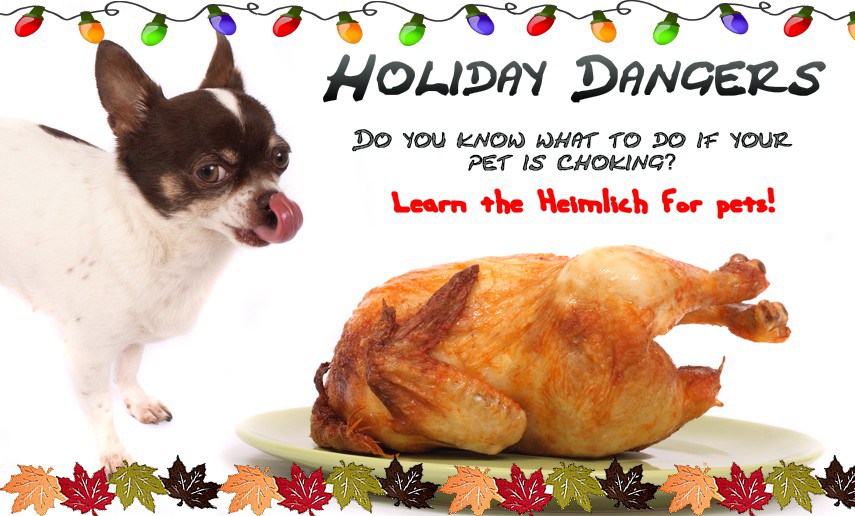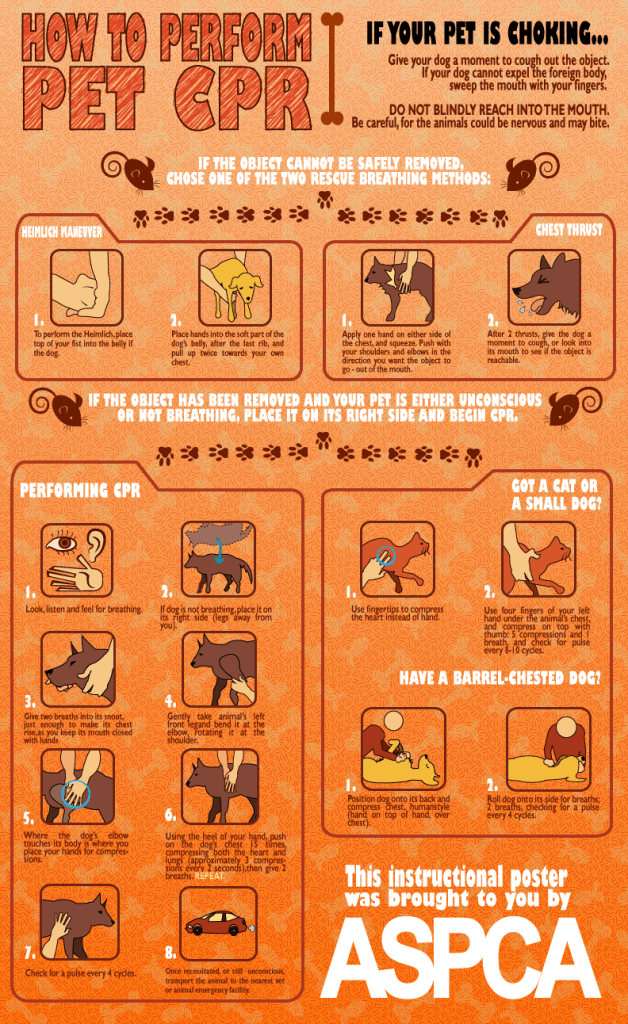
Would you know what to do if you walked into the room and found your dog or cat choking? If you are like the majority of pet owners, you’d probably panic and perhaps scramble to locate your vet’s phone number.
While you should always keep your vet’s number (and the number of the nearest 24-hour emergency clinic) prominently displayed by your phone, a choking pet needs your immediate attention. Minutes can actually make the difference as to whether your pet lives or dies.
So if your pet is choking, remain calm, open your pet’s mouth and check for any foreign objects. Remember, a frightened.or distressed pet may bite or scratch. Personally, when one of my pets is in trouble, I really don’t care about a bite or a scratch! To minimize the risk, place your fingers on your pet’s palate – this will prevent him from biting down.
Once you’ve removed any foreign objects and your pet still appears to be in distress, use the Heimlich Maneuver. This same “hug of life” which works for humans by forcing air to dislodge obstructions in the throat or larynx can be used on dogs and cats.
If your pet is small or has collapsed:
- Place your pet on his side on a hard surface (i.e. the floor or a table).
- Place both hands just behind the last rib and press down quickly and firmly.* Release immediately and repeat rapidly several times. Try to direct the force of your hands slightly forward – this will make your efforts more effective.
- Have someone open your pet’s mouth wide and attempt to retrieve the foreign object as it is forced out of your pet’s throat.
If your pet is large and is able to stand:
- Straddle your pet, placing him between your legs.
- If someone is with you, have them help keep your pet’s mouth open.
- Place both hands under your pet, again below the last rib, and lift with quick thrusts upward and forward several times. Continue until the airway is clear.
THE FINAL STEP – Once your pet is breathing normally, even if he seems fine, get him to the vet. Remember, the Heimlich Maneuver is a form of first aid – the immediate care given to a pet until proper medical care arrives.
Ideally, prevention is preferable to having to employ the Heimlich Maneuver. That’s why I do not advocate giving our cats and dogs turkey, chicken, beef, pork or lamb bones – they can splinter and get caught in our pets’ tiny throats. The same warning goes for decorating holiday trees with tinsel. However, we can’t forsee every danger to our pets, so it’s important you take the time now to review the steps I’ve outlined. By doing so, you just may save yourpet’s life!
*Obviously, you would not use the same amount of pressure on a cat or Yorkshire Terrier as you would for a Great Dane. If you are unsure how much pressure to apply, check with your vet and review the procedure with him before an emergency arises.

 Warren Eckstein, host of The Pet Show, is an internationally known pet and animal expert. Warren has devoted over thirty years to teaching both pets and their people to live happily together through his unique “Hugs and Kisses” approach to animal behavior, care and training.
Warren Eckstein, host of The Pet Show, is an internationally known pet and animal expert. Warren has devoted over thirty years to teaching both pets and their people to live happily together through his unique “Hugs and Kisses” approach to animal behavior, care and training.
Warren has worked with more than 40,000 pets including those of many well-known celebrities. David Letterman, Cheryl Tiegs, Lily Tomlin, Geraldine Ferraro, Al Pacino, Rodney Dangerfield, and Phylicia Rashad are just a few of many whom Warren has helped with pet problems.


Sherry Elgan
Hi Warren,
I rarely get to listen to your show, but when I can I enjoy it immensely!
We have a 7 yr. old male German Shepherd. Sammy is a wonderful dog, and we love him dearly. He is sweet, loving and we are so glad we adopted him
6 1/2 years ago!!
We are however, beginning to have a problem we dont know how to break.When my daughter and I both leave the house at the same time, he starts whining, very loudly. We always give him a treat when we leave, and tell him we will be back soon. Giving him hugs and kisses. Nothing seems to work, he just keeps whining so loudly, it is very hard to even get out the door. What can we do to help him know that we arent leaving him for good, but will be back?